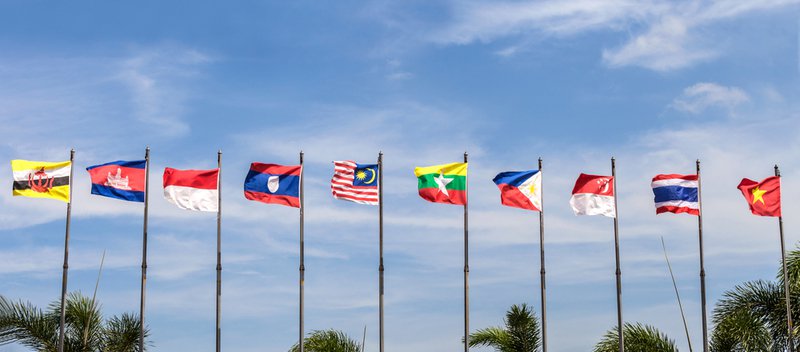51st ASEAN Foreign Ministers’ Meeting
July 30, 2018 | Expert Insights

Singapore is hosting the 51st ASEAN Foreign Ministers’ Meeting (AMM) from 30th July to August 4th.
Background
The Association of Southeast Asian Nationsis a regional intergovernmental organization, established in 1967, comprising ten Southeast Asian countries that promotes intergovernmental cooperation. It also regularly engages other states in the Asia-Pacific region and beyond. Being a global powerhouse in the political arena, the central platform for cooperation in Asia-Pacific, and one of the world's most prominent organisations, ASEAN maintains a global network of alliances and is involved in numerous international affairs.
The ASEAN Summit is a semiannual meeting held by the members of the Association of Southeast Asian Nations in relation to economic, political, security and socio-cultural development of Southeast Asian countries. The ASEAN Foreign Ministers’ Meeting (AMM) was established in 1967. There were meetings held on an annual basis with informal meetings and retreats in between. The 50th AMM was held in Manila, Philippines between 2nd to 8th of August 2017.
The ASEAN Plus Three (APT) will be held with China, Japan and South Korea. East Asia Summit (EAS), clubs ASEAN and eight dialogue partners, that is, China, Japan and South Korea, plus India, Australia, New Zealand, the United States and Russia. The ASEAN Regional Forum (ARF) is conducted with all EAS members, ASEAN's two other dialogue partners Canada and the EU, plus Papua New Guinea, Timor-Leste, Mongolia, North Korea, Bangladesh, Pakistan and Sri Lanka.
Analysis
The 51st ASEAN Foreign Ministers’ Meeting (AMM) and related Meetings will be held in Singapore this week. The meetings will witness Foreign Ministers take stock of progress in regional cooperation, prepare and respond to disasters, restore commitment in free trade and chart the way forward towards implementing the ASEAN Leaders Vision for a Resilient and Innovate ASEAN.
In a press release on Saturday, it was announced that Singapore’s Minister for Foreign Affairs Dr Vivian Balakrishnan will chair the 51st AMM, 19th ASEAN Plus Three (APT) Foreign Ministers Meeting (FMM), 8th East Asia Summit (EAS) FMM, and 25th ASEAN Regional Forum (ARF), as well as co-chair the ASEAN-China Post Ministerial Conference in Singapore’s capacity as ASEAN-China country coordinator.
Singapore’s Ministry of Foreign Affairs(MFA) said, "They will also discuss how to further strengthen ASEAN Centrality and unity, review ASEAN’s external relations, and exchange views on regional and international issues." At the PMCs, MFA noted that the ASEAN FMs will meet their counterparts from ASEAN’s Dialogue Partners to discuss both ongoing and future cooperation.
Analysts expect North Korea to be the prime focus in these meetings. The ASEAN Regional Forum on Saturday will be the first time its foreign minister Ri Yong Ho meets his counterparts from ASEAN since the warming of ties between the two Koreas as well as between DPRK and the US.
The ASEAN -China Strategic Partnership Vision 2030 is to be adopted at the Asean-China Summit this year. Chinese Foreign Minister said Malaysia and Singapore are both important Asean members, and friendly neighbours and important partners of China. He said cooperation between China and ASEAN has grown in the last 15 years, and called the relationship "the most successful and dynamic example in Asia-Pacific regional cooperation". However, Singapore will hand over to the Philippines after the meeting, which will be watched for signs of progress on a framework for a code of conduct in the South China Sea.
The EU High Representative for Foreign Affairs and Security Policy Federica Mogherini will also be in Singapore this week, as will US Secretary of State Mike Pompeo, Japanese Foreign Minister Taro Kono and South Korean Foreign Minister Kang Kyung-wha, among others.They will meet their counterparts from ASEAN members and others to discuss both ongoing and future cooperation. One area of focus is tie-ups on developing Smart Cities.
The key themes to look forward to at the conference are some sensitive issues that have plagued South Asia. Questions on issues such as Rohingya refugees and tensions in the South China Sea are expected to be raised. Recent disasters like the dam collapse and floods in Laos could also see discussions on how the region can better respond to incidents, and adopt mitigation strategies to minimise their likelihood and casualties.
Assessment
Our assessment is that AMM and the related meetings in Singapore will see South Asia emerge as a new strategic partner for non-members. We feel that the ASEAN countries’ reiteration for ASEAN centrality in the region’s development will ensure unity amidst rivalry between external powers. We believe that the themes likely to surface apart from North Korea are the importance of a rules-based order, and ways to ensure the regional architecture remains open and inclusive amid recent talk of an Indo-Pacific strategy by the US and Japan. We also believe that the PMC will at least open dialogue on South China Sea if not provide a viable solution.








Comments